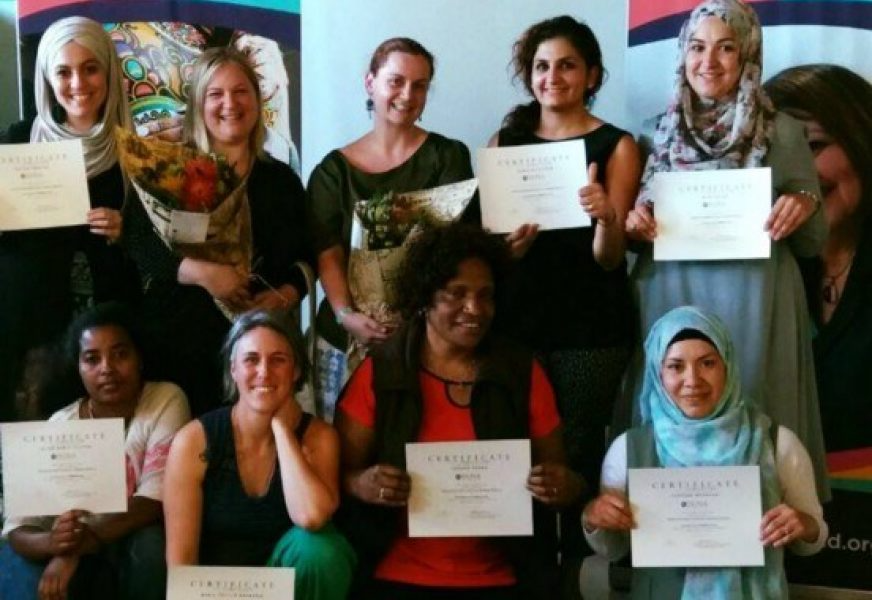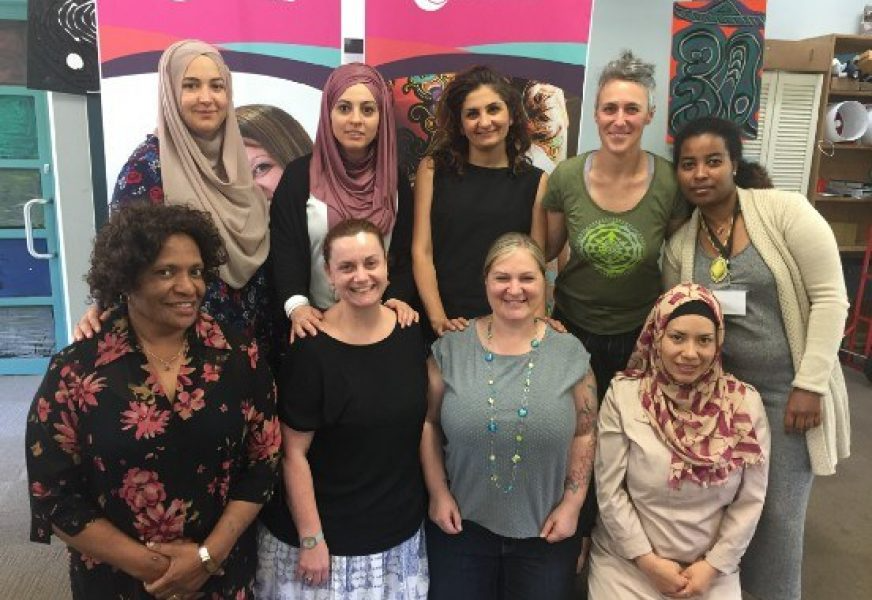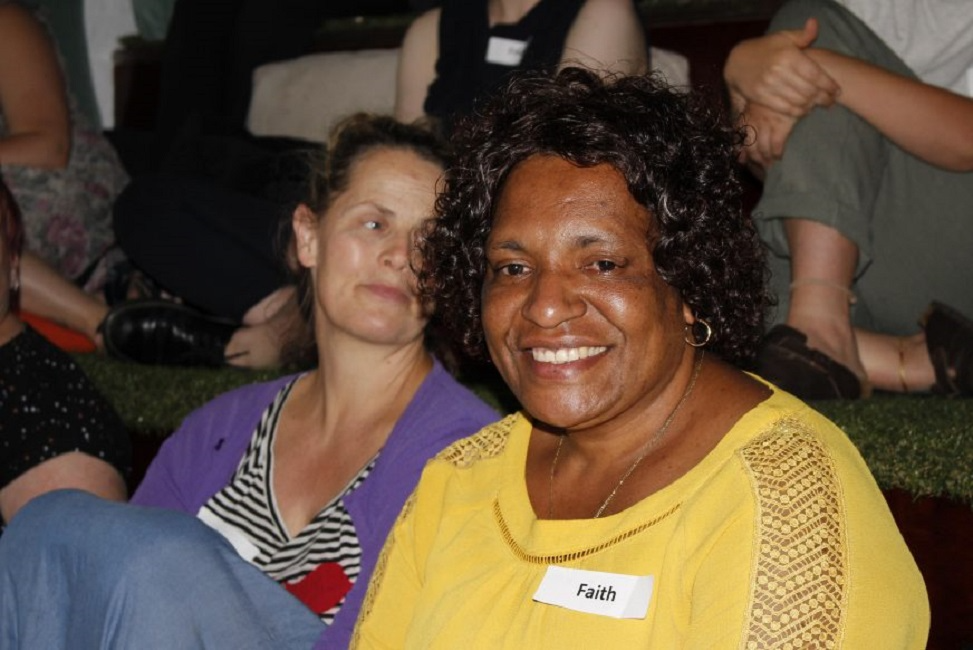Originally from Papua New Guinea, Faith sought protection here in Australia from a violent partner before finding her way to Birth for Humankind’s doula training. We sat down with her this World Doula Week to learn more about her and her passion for supporting women.
Faith, thank you for taking the time to share a little more of your story with us. You were a teacher in Papua New Guinea, before you came to Australia, is that right?
Yes, I graduated with a diploma in primary school teaching, a three year course, in Papua New Guinea. Straight after graduating, my job was there for me in the new year and I started teaching a class of about 40 students in a rural area. It was very remote. I taught in the village and then I got married and transferred to the city, Port Moresby, where I taught for some time. Altogether I taught for about 22 years.
Wow, that’s incredible! What did you love about teaching?
I loved working with children because they got me motivated, it made my day stress-free. Given I had problems at home, when I went to the workplace it was fun working with them. Seeing them giving you respect every time when you come in [the classroom], you always have someone to talk to and even if they have issues, they felt like I was their mother and they talked to me so it was a good job. I liked my career.
Can you tell us a little more about where you grew up?
I grew up in the village, as a child, and I was the only person educated in my family. I was raised by my uncle, my mother’s brother, and I was fortunate to go to school. My two brothers grew up with my father where there was trouble all the time, so they never went to school. Because of the trouble and fights the boys wouldn’t be able to go to school properly.
My father and mother had a divorce so she stayed with me, and her brother, in her home village so she could be able to raise me. I went to primary school in the village and then I went onto high school, boarding school, for 4 years. Then after graduating I went to teachers college in another province and graduated with a diploma and went back to my mother’s village to teach. Then I got married and had five children. They are 22, 19, 15, 12 and 9.
Tell us more about what it was like to give birth in rural Papua New Guinea.
That is a long story! Giving birth in PNG is not as easy as in Australia. We have factors that really make birthing and raising children a little bit more difficult, which women have been so strong to stand against. Pregnancy and sexuality is not talked about. It’s a traditional custom, these things were kept unknown. They mustn’t be said among families and groups, so only when the stomach grows and the mother changes, then ‘oh she’s expecting a baby’. The mother would be wearing big blouses to cover her stomach, she feels ashamed, whereas here I see that women are excited about their pregnancy — it’s quite a different thing.
In our country, when women have their monthly period they are not supposed to cook food and give to the man. They are confined within the family house. I had a miscarriage earlier on, and that stirred up some kind of trouble among the family. They were thinking that I was to blame. So when I was pregnant again, I would go for antenatal visits at the hospital in the city. I would go by bus, public bus. At that time, we never had a car. So by public bus I would go there and then after that I would go back to work until the baby was due.
For my first baby I was thinking I was having period pain, I didn’t know the baby was coming, I didn’t know it was labour. I told my husband, ‘I think we have to go to the beach’ because some people told me that sometimes when you have your contractions it helps. I did not know that to be true, I didn’t even attend the birth education class, I didn’t get any birth education — so I didn’t know the process of birthing. I was 20. I was thinking ‘if the contractions like keep coming continuously, and very sharp, then the baby is coming and you go to the hospital.’ I heard that from my friends. So that’s why I thought ‘oh it’s far away, let’s go to the beach’. So I left my husband somewhere in the carpark and I was walking back and forth on the beach just to get the contractions to go away. And then my contractions got a little bit faster and I told my husband ‘I think we have to go to the hospital’.
In our country, the husband doesn’t come into the birthing room or even other people as well, like a sister and my mum, would never come — only the midwife. Midwife, me, and the nurse or the doctor. So my husband just left me at the door of the labour ward and he went away. My midwife told me to get on the bed and to get ready for her to check my cervix. So I did and she just said ‘oh already seven’. I didn’t know what seven was! She told the other nurses ‘already seven’ and then just told me to stay in the bed. After two hours or so, I heard the midwife say they were doing a cut, no painkillers, no nothing, no injection, no nothing, just that and then I had my baby.
That is certainly very different to how many women give birth in Australia with a room full of people! So your four other children, were they all born in hospitals?
Yes, they were all born in hospitals. Three were in the general hospital near the village, two in the big city — my first and my last. The village has a small clinic but they are not working in the night, only in the day, so I had to go to the general hospital in town.
You mentioned that you hadn’t had any birth education at all, do you wish that more women would have that education?
Exactly. I wish that my country women would have this birthing education. They need it. They need it.
You are clearly passionate about women’s education. So, now that you’re in Australia, what made you think ‘maybe I’ll become a doula’?
I have a heart for women because when I went through my birthing process, I never had anyone. I never had anyone. Even my mum. They weren’t around. I had all the babies alone, by myself. So that kind of intrigued me that I could give [support] to someone that needs it. I want to be a doula to be there for them. I really needed someone and that someone was never there, so me being a doula would fit for that person who needs me. If they don’t need me, fine, but for the people that need me, I would be there.
Here, through the Asylum Seeker Resource Centre, people are trying to help us get some formal education, upgrade our skills, get a job, so they are helping me in that way. It is better to be happy and free of fear, than to come back to the life that I was [living]. I feel safe in Melbourne.
So you went through our bicultural training with DONA International in November last year alongside seven other bicultural doulas. How was that?
That was a change of my life to see how important a doula was to a birthing mum. If it’s the birthing mum that’s delivering, the doula is also delivering the birth mum at that point.
Some people describe the role of the doula as ‘mothering the mother’. Do you think that describes it accurately?
Yes exactly that’s right. That’s the conclusion that I drew after going through that course. I came back [after], I felt challenged, in a good way, because I thought the job was easy back in my country — you know that some is just comforting them, carry their bag, maybe hold her baby for her to take a break, giving her some water — this is all I thought. But when I went to the training, it changed me completely. Now I see how important it is to give her the emotional support that she needs at that moment. I myself never realised that it is very stressful situation that women had to go through, I thought it was a process in life, but for women I see that it is never a process in life, it is much more than that.
How was it meeting all of the other women in the course?
Meeting all the other women in the course was like, I felt that I was part of them. They could say openly how it felt to be a doula, that made me open up a bit, see the world, because as I said — in our culture, [we] don’t learn to share openly, and having a baby is like something secret. I remember my mum would tell me stories of birthing, and when they gave birth they would go to the bush, they had the baby and buried the placenta, clean the babies, then come home three days later with the baby fresh and clean.


Now you’ve completed the DONA International training, you received a scholarship from Dial a Doula to undertake their 20 week foundational doula training as well! How does it feel to be part of that great program?
I was really excited, more than excited! I was privileged to be given a scholarship. My background is not nursing or midwifery so I still need to learn, and I’m still learning. I just want to help women, that’s all. I want to be there for someone who needs me. Supporting a pregnant woman is the best way for me to do that because that’s the only time a woman really needs you; other times, they’re okay, they have their families, they have their partners, they have their kids, they have their job, they don’t need you — but at this time, they need you. They need someone. So that’s the time that I feel that I have to give it to them. So that moved me, I felt something within my heart that moved me, and I was just so thankful to Birth for Humankind and Dial a Doula for giving me the scholarship because that will help me to learn more.
And once you have finished the course you will become a doula with Birth for Humankind?
Yes, eventually. I want to become a volunteer for Birth for Humankind for some time, for how long it takes. I want to get used to working with more women. I want to support women from PNG, but also other women. Something that makes me feel more comfortable [in the doula training] is that most of the ladies are not midwives, not nurses, so that makes me feel comfortable. I think ‘well, if they can do it, I can do it!’
We are raising ‘moolah for doulas’ who support pregnant women across Melbourne who would otherwise have little to no support. Can you help?

